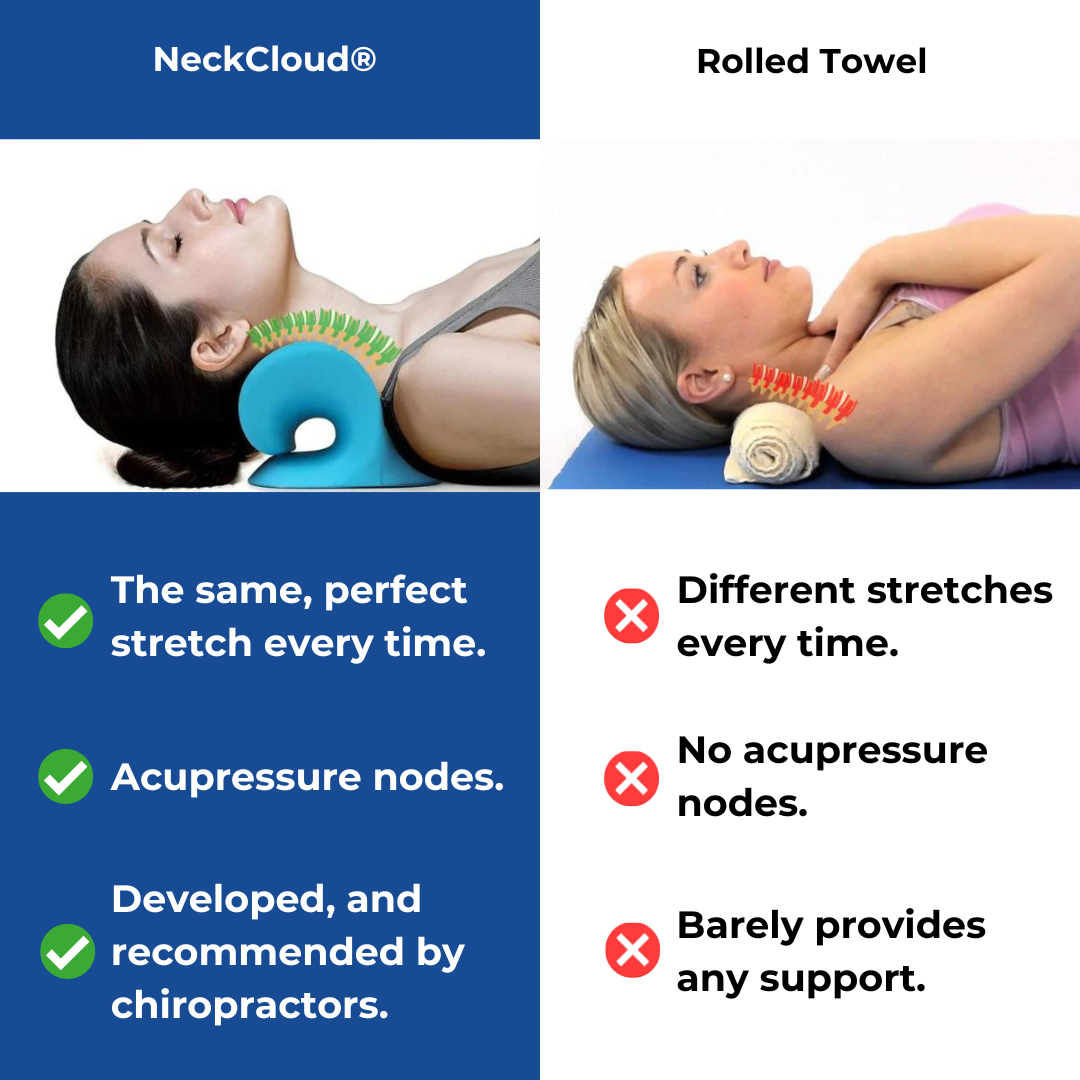Get Long Lasting Relief with the Neck Cloud: The Ultimate Neck Support
Get Long Lasting Relief with the Neck Cloud: The Ultimate Neck Support
Blog Article
The Influence of Tension on Neck Discomfort: Methods for Reducing Stress and Discomfort
In today's busy globe, it's no key that stress and anxiety has become a widespread element in the start and exacerbation of neck pain. The detailed relationship in between stress and anxiety and muscle stress typically leaves people seeking relief from the pain that follows. By exploring targeted methods intended at reducing tension and advertising leisure, one can start to address the root triggers of neck discomfort and job towards a more balanced state of health. Join us on a trip to unravel the effect of anxiety on neck discomfort and uncover reliable ways to reduce discomfort and boost overall lifestyle.
Recognizing Stress-Related Neck Discomfort
Neck discomfort is a typical problem that can commonly be associated to stress. Stress-related neck pain can manifest as tension, stiffness, or pain in the neck and shoulder location. The connection between stress and neck pain lies in the body's physiological response to stress, which can cause muscular tissue stress and tightness in the neck muscles. Persistent stress and anxiety can cause consistent neck pain and exacerbate present problems like cervical spondylosis or muscle mass strains.

Identifying Common Stress Areas
Frequently experienced by individuals under stress, stress locations in the body can give useful understandings into the physical indications of mental pressure. One common stress location is the neck, where tension commonly manifests physically. Stress frustrations, stiff neck muscle mass, and limited series of motion prevail signs and symptoms of stress-related neck tension. The shoulders are one more typical location where stress accumulates. Tension can trigger the muscle mass in the shoulders to tighten up, bring about discomfort and pain. Furthermore, the upper back is susceptible to stress accumulation, specifically in people who experience chronic stress and anxiety. Poor posture and extended sitting can worsen stress in this field. The jaw is additionally an usual area for stress-related stress, as many people clinch their jaw or grind their teeth when emphasized. Recognizing these usual stress locations can aid people identify the physical indicators of stress and anxiety and take actions to resolve them before they escalate into persistent discomfort or pain.
Applying Leisure Methods
To effectively manage stress-related stress in the body, carrying out relaxation strategies is vital. Relaxation techniques are beneficial tools for reducing neck discomfort brought on by tension. Deep breathing workouts can assist calm the mind and loosen up strained muscles in the neck and shoulders (neck cloud). Exercising mindfulness meditation Get More Information can additionally be helpful in reducing stress and anxiety and promoting leisure. Modern muscle leisure, where you systematically strained and after that relax different muscle mass teams, can release built-up tension in the neck location. Furthermore, tasks like yoga and tai chi include both physical movement and leisure, making them effective techniques for reducing anxiety and neck pain. Taking normal breaks throughout the day to stretch and relax can protect against muscle rigidity and tension from collecting. By including these relaxation methods right into your daily regimen, you can aid manage stress and anxiety levels, minimize tension in the neck, and minimize pain linked with stress-induced neck pain.
Integrating Self-Care Practices
Integrating self-care techniques is crucial for maintaining overall well-being and handling stress-related neck discomfort effectively. Taking part in regular physical activity, such as gentle extending workouts or yoga exercise, can aid relieve stress in the neck and shoulders. Exercising great position throughout the day and taking frequent breaks from prolonged sitting or display time can additionally protect against pressure on the neck muscle mass.
Moreover, prioritizing sufficient sleep and developing a regular sleep routine can contribute significantly to reducing stress and anxiety degrees and advertising relaxation. Creating a relaxing going to bed regimen, such as reviewing a publication or taking a warm bath, can aid prepare the mind and body my company for relaxing sleep. In addition, keeping a balanced diet abundant in nutrients and staying moistened can sustain overall wellness and minimize inflammation that might worsen neck pain.
Incorporating mindfulness methods, such as deep breathing exercises or reflection, can assist manage stress and anxiety and advertise relaxation. Requiring time for oneself, engaging in hobbies, and establishing boundaries to shield personal time are additionally crucial aspects of self-care that can add to reducing anxiety and easing neck pain.
Looking For Professional Assistance
How can people effectively attend to persistent neck discomfort that is impacting their day-to-day live and health? Seeking expert aid can be a vital step in handling and alleviating neck pain. Consulting with medical care professionals such as chiropractic specialists, physiotherapists, or orthopedic experts can supply useful insights and customized therapy plans. These professionals can carry out extensive evaluations to diagnose the underlying reasons of neck pain and advise appropriate treatments.
Chiropractors specialize in spinal control methods to enhance alignment and reduce tension in the neck area. Physiotherapists offer targeted exercises and stretches to strengthen muscles, improve flexibility, and enhance overall neck function. Orthopedic professionals can give innovative clinical treatments such as shots or surgical choices for severe cases of neck pain.
Conclusion

Stress-related neck pain can materialize as tension, stiffness, or discomfort in the neck and shoulder area. The connection between anxiety and neck discomfort exists in the body's physical action to stress and anxiety, which can result in muscular tissue stress and rigidity in the neck muscle mass. Tension migraines, stiff neck muscles, and restricted array of activity are common signs of stress-related neck tension. By incorporating these leisure strategies right into your everyday routine, you can help manage stress and anxiety degrees, lower stress in the neck, and ease pain connected with stress-induced neck discomfort.

Report this page